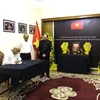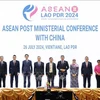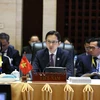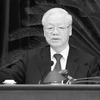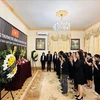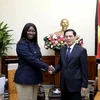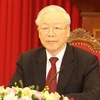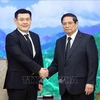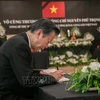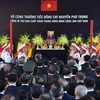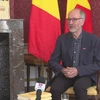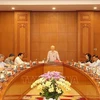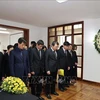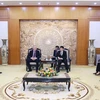The establishment of the Communist Party of Vietnam (CPV) 85 years ago is an important milestone in the fate of the nation of Vietnam.
The Party was formed at a conference from February 3-7, 1930 in Kowloon, China's Hong Kong, during which the Communist Party of Indochina, the Communist Party of Annam, and the League of Indochinese Communists merged to form a single party, the CPV.
The foundation of the Party broke the deadlock in the search for revolutionary ideas in Vietnam.
The Party advocated the proletarian revolution, combining national liberation revolution with socialism and making the revolution in the country one part of the world revolutionary the vanguard force of which being the great Russian October Revolution.
The selection of the revolutionary path was a historical decision, made in line with the desires and interests of the Vietnamese people and helping the CPV lead Vietnam’s revolution from victory to victory.
The CPV led the successful August Revolution and then defended the first People’s Democratic Government in Southeast Asia.
The Party, under the leadership of President Ho Chi Minh, navigated the Vietnamese revolution through significant hardships in the context of a battered national economy, rampant hunger and illiteracy and powerful enemies attempting to overthrow the revolutionary government.
The two resistance wars to defend the country against aggressive colonists and imperialists were marked by the glorious triumphs on the Dien Bien Phu battlefield and the Ho Chi Minh Campaign in April 1975, reunifying the country and opening a new era of independence, freedom, and socialism for the nation of Vietnam.
Significant achievements were seen in the development and defence of the nation, creating a socialist country of the people, for the people, and by the people. The Party has led the efforts in developing a socialist-oriented market economy, promoting a modern culture with strong national identity, and strengthening people-based defence and security measures capable of protecting the country’s stability and territorial integrity.
Impressive successes were seen in the comprehensive reform of the country. Despite numerous hardships caused by the blockade and embargo from imperialistic forces, alongside the collapse of socialism in East European countries and the Soviet Union, Vietnam remained steady and prospered with a stable socio-political situation. The country’s economy rose out of crisis and made strong steps forward, improving the living conditions of the people. Fruitful outcomes of the “doi moi” (reform) process created new strength and status for Vietnam.
The country has expanded its foreign relations and international integration, particularly ties with neighbouring and regional countries, as well as world powers, traditional friends, and important partners.
In recent years, the country has actively joined regional and international forums and organisations, becoming a member of the World Trade Organisation, performing well its role as a non-permanent member of the United Nations, and contributing tireless efforts towards building an ASEAN Community.
With these efforts, Vietnam has secured an increasingly prominent position on the global stage, creating favourable conditions for the country’s national development and defence.
All the victories in Vietnam’s revolution over the past 85 years vividly reflect the incredible strength of the nation, which was brought into full play by the sound leadership from the CPV.
The Party has properly combined the Marxism-Leninism and Ho Chi Minh ideology with patriotism, national tradition and humanity’s quintessence, and the continuous growth of the country will come about through its unquestionable national strength .-VNA
The Party was formed at a conference from February 3-7, 1930 in Kowloon, China's Hong Kong, during which the Communist Party of Indochina, the Communist Party of Annam, and the League of Indochinese Communists merged to form a single party, the CPV.
The foundation of the Party broke the deadlock in the search for revolutionary ideas in Vietnam.
The Party advocated the proletarian revolution, combining national liberation revolution with socialism and making the revolution in the country one part of the world revolutionary the vanguard force of which being the great Russian October Revolution.
The selection of the revolutionary path was a historical decision, made in line with the desires and interests of the Vietnamese people and helping the CPV lead Vietnam’s revolution from victory to victory.
The CPV led the successful August Revolution and then defended the first People’s Democratic Government in Southeast Asia.
The Party, under the leadership of President Ho Chi Minh, navigated the Vietnamese revolution through significant hardships in the context of a battered national economy, rampant hunger and illiteracy and powerful enemies attempting to overthrow the revolutionary government.
The two resistance wars to defend the country against aggressive colonists and imperialists were marked by the glorious triumphs on the Dien Bien Phu battlefield and the Ho Chi Minh Campaign in April 1975, reunifying the country and opening a new era of independence, freedom, and socialism for the nation of Vietnam.
Significant achievements were seen in the development and defence of the nation, creating a socialist country of the people, for the people, and by the people. The Party has led the efforts in developing a socialist-oriented market economy, promoting a modern culture with strong national identity, and strengthening people-based defence and security measures capable of protecting the country’s stability and territorial integrity.
Impressive successes were seen in the comprehensive reform of the country. Despite numerous hardships caused by the blockade and embargo from imperialistic forces, alongside the collapse of socialism in East European countries and the Soviet Union, Vietnam remained steady and prospered with a stable socio-political situation. The country’s economy rose out of crisis and made strong steps forward, improving the living conditions of the people. Fruitful outcomes of the “doi moi” (reform) process created new strength and status for Vietnam.
The country has expanded its foreign relations and international integration, particularly ties with neighbouring and regional countries, as well as world powers, traditional friends, and important partners.
In recent years, the country has actively joined regional and international forums and organisations, becoming a member of the World Trade Organisation, performing well its role as a non-permanent member of the United Nations, and contributing tireless efforts towards building an ASEAN Community.
With these efforts, Vietnam has secured an increasingly prominent position on the global stage, creating favourable conditions for the country’s national development and defence.
All the victories in Vietnam’s revolution over the past 85 years vividly reflect the incredible strength of the nation, which was brought into full play by the sound leadership from the CPV.
The Party has properly combined the Marxism-Leninism and Ho Chi Minh ideology with patriotism, national tradition and humanity’s quintessence, and the continuous growth of the country will come about through its unquestionable national strength .-VNA
